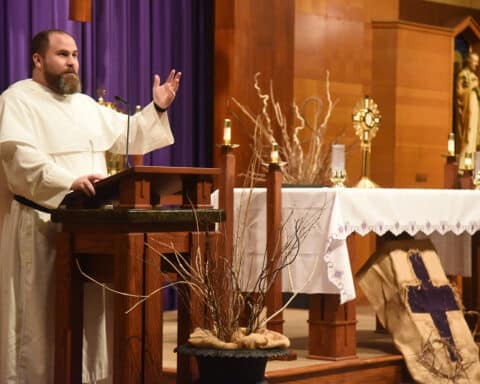
The temptation of any faithful Massgoer is simply to dismiss Carroll. Over the years, his columns in the Boston Globe have exhibited a skinny grasp of both theology and ecclesial history alike.
At the same time, the article reveals a pain that many Catholics have experienced. When we discover that our prelates and our priests have abused young children, seminarians and disabled men and women, what do we do? Do we simply participate in the life of the Church as normal? Is there a fear that our normal participation communicates to ecclesial leaders that we’re not that upset?
| The Solemnity of the Most Holy Body and Blood of Christ (Corpus Christi) – June 23, 2019 |
|---|
|
GN 14:18-20
PS 110:1, 2, 3,4 1 COR 11:23-26 SEQUENCE LAUDA SION LK 9:11 |
Keep the ship on the same course, because we’ll be there no matter what happens. The feast of Corpus Christi is a reminder that many of us have been there all along and will continue to stay, even when the clergy are corrupt. We don’t show up to church for excellent preaching. We don’t show up for clerical virtue. We show up because only in this place can we receive the gift beyond all gifts and love beyond all loves: the very sacrifice of Christ that renews the cosmos.
In 1 Corinthians Chapter 11, St. Paul describes the words that he has received, the foundational story that is at the heart of the Eucharist. Jesus gave his body as bread. He gave his blood as wine. Each time we eat this bread, each time we drink this cup, we meet our risen Lord.
These words of institution, proclaimed daily at the Holy Sacrifice of the Mass, are why many of us will continue to show up at Mass. The corruption of the Church is not novel. A volume of ecclesial history could be written describing the corruption that has dwelt in the Church in each era.
Still, the Lord who offered himself in love upon the cross continues to make himself available to men and women. He makes himself available to the Church in every era because Jesus Christ loved us. He loved us unto the end.
I show up to Mass week after week, even in the midst of scandal, because I come to meet the risen Lord made available in the Eucharist. The feast of Corpus Christi must challenge each of us to conform ourselves more fully to this mystery.
In Thomas Aquinas’s sequence for the feast, Lauda Sion, we sing, “Very bread, good shepherd, tend us Jesu, of your love befriend us, you refresh us, you defend us, your eternal goodness send us in the land of life to see.”
Jesus Christ entered into a world that loved darkness. And still, Jesus Christ comes to us in a Church that often loves the world of darkness too much.
The Eucharist is therefore not a way of upholding the status quo. It is instead a radical challenge to any member of the Church — clergy or lay — who has forgotten that the God we worship is not one of power or prestige but love unto the end. This God comes to us week after week. Day after day. This God feeds us with his true flesh and his true blood.
Rather than rid us of the priesthood, as Carroll suggests, it is better to hold up this mystery of the Eucharist as the very meaning of the priesthood, bishops, cardinals and the papacy.
My answer to Carroll is that we need better priests. We need better Christians. Most importantly, we need the Eucharist.
Timothy P. O’Malley, Ph.D., is director of education at the McGrath Institute for Church Life at the University of Notre Dame.





